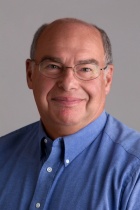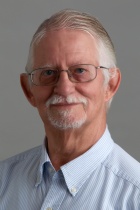Retiring Faculty
Prof. Michael Detty

Prof. Detty joined UB in 1995 after spending 17 years as a researcher at the Eastman Kodak Company in Rochester, New York, where he worked on teams that specialized in the development of novel infrared-absorbing dye chromo-phores. At Kodak, he published 62 peer-reviewed publications and generated 26 patents, receiving the Kodak CTO disorder, hydrogen bonding, absolute Patent Award in 1994 for his efforts.
At UB, Detty’s research focused on the design of molecules for specific functions in medicinal chemistry, materials science, aerobic catalysis, solar energy, biofouling and biomedical imaging. His research group worked with local, national and international partners to develop technologies in areas ranging from photodynamic therapy to solar energy harvesting.
In his years at the university, Detty authored more than 130 peer-reviewed publications and was named as an inventor on seven additional U.S. patents. Detty also devoted considerable energy to training the next generation of scientists and took on multiple leadership roles in the Department and the University. He mentored over 50 PhD and Master’s degree students, served as chair of the Chemistry Department (2012-16), and as director of the Center for the Arts (2016-18).
Detty was recognized in 2000 with the Milton Plesur Excellence in Teaching Award from the UB Undergraduate Student Association, and in 2004 with the SUNY Chancellor’s Award for Excellence in Teaching. In 2016, Detty received the Jacob F. Schoellkopf Medal (WNY ACS) in recognition of his fundamental research in organoselenium and organotellurium chemistry, and his development of applications of this chemistry toward advances in photodynamic therapy and marine anti-fouling technology.
We thank Profs. Detty and Churchill for their myriad contributions to UB and our department, and we wish them all the best in retirement.
Prof. Melvyn Churchill

Prof. Churchill joined the Department of Chemistry at UB as Professor in 1975 after starting his academic career at Harvard University (1964-1971), with a brief stint at the University of Illinois Chicago (1971-75). At the time of his retirement, Churchill was the longest serving faculty member in the Department of Chemistry among the current faculty.
Churchill was born in London, England (1940) and received his undergraduate and graduate education at Imperial College, London. His PhD was under the joint tutelage of Profs. Geoffrey Wilkinson and Ronald Mason. While at UB, his research in crystallography and fundamental inorganic chemistry focused on the determination of the molecular geometry of unusual organometallic molecules, with specializations in X-ray diffraction studies of organometallic and inorganic complexes, crystallographic configuration, and developing methods of solving disordered structures, particularly pseudo-symmetrical metal cluster derivatives. Churchill authored over 500 peer-reviewed publications during his prolific academic career.
He is co-author with his son David, of a bilingual (Korean/ English) Freshman Chemistry textbook. Churchill’s most impactful publication, a single-author paper in Inorganic Chemistry titled “Some comments on carbon-hydrogen and nitrogen-hydrogen distances assumed in, and determined from, recent X-ray-diffraction studies on inorganic complexes” has been cited more than 600 times and truly transformed the solution of crystal structures.
Churchill served as associate editor of Inorganic Chemistry (1970-82), and received numerous awards for his contributions to the field, including Alfred P. Sloan Foundation fellowship, Corday-Morgan Medal & Prize from the Chemical Society, London, and Jacob F. Schoellkopf Medal from WNY ACS. He was recently elected a Fellow of the Royal Society of Chemistry. Churchill has been an active participant in UB’s Faculty Senate since 1992. He mentored 30 PhD and Master’s degree students as well as numerous postdoctoral scholars.
Churchill has also distinguished himself as a devoted teacher. He has taught general chemistry to generations of undergraduate students passing through UB’s doors.